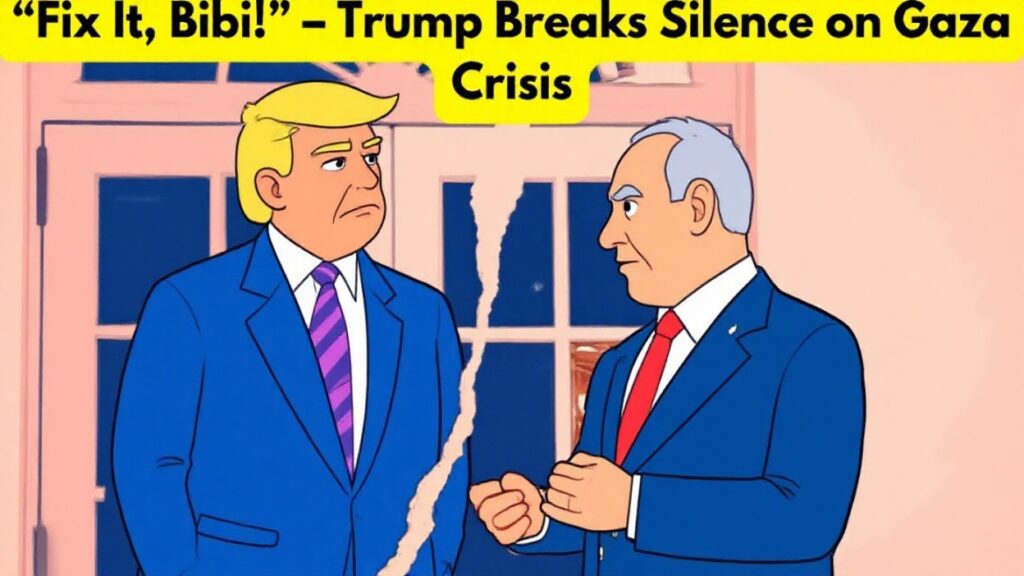Trump Netanyahu Gaza confrontation took center stage during a stunning admission made by former U.S. President Donald Trump on his recent UK tour, where he directly confronted Israeli Prime Minister Benjamin Netanyahu over the worsening Gaza starvation crisis. Speaking at a press event in Scotland, Trump revealed:
“I told Bibi to fix it.”
This blunt remark confirmed longstanding rumors of rising tensions between the two allies. Trump’s comments mark a rare public rebuke of Netanyahu, triggered by global outrage over Israel’s blockade on humanitarian aid and escalating civilian suffering in Gaza.
Table of Contents
Netanyahu Under Growing Pressure as International Backlash Mounts
The Trump Netanyahu Gaza confrontation isn’t just about diplomatic disagreement—it highlights a major rift in public perception. While Netanyahu continues to justify Israel’s actions as necessary for national security, Trump’s words indicate a shift in political calculus.
Human rights groups, including Amnesty International and the UN, have raised alarms over the famine-like conditions in Gaza, warning of war crimes. In Washington, even conservative lawmakers are expressing unease. A former Pentagon official stated:
“When a key ally like Trump calls out Bibi, it sends a message: the world is watching, and patience is wearing thin.”
The confrontation also puts Netanyahu in a delicate position domestically, as far-right factions within his coalition remain unyielding on Gaza.
Why the Trump Netanyahu Gaza Confrontation Matters
This Gaza confrontation isn’t just symbolic—it has strategic implications. Trump’s public disapproval could sway GOP base sentiment, potentially affecting U.S. foreign aid policy toward Israel. Moreover, it emboldens international efforts pressing for a ceasefire and renewed peace talks.
Analysts believe Trump’s move is calculated. With 2024 elections looming, he appears to be appealing to both his base and a broader electorate alarmed by humanitarian issues. It also positions him as a global statesman—a contrast to Biden’s more cautious tone on the Gaza situation.
“This wasn’t just a critique—it was a power play,” said Middle East analyst Lara Youssef. “Trump is signaling that even allies can be held accountable.”
Humanitarian Crisis in Gaza: The Flashpoint

Over 2.2 million Palestinians in Gaza now face severe food shortages. Multiple UN agencies have stated that Israel’s continued blockade of aid convoys, water supplies, and medical access could amount to collective punishment.
Despite sporadic aid deliveries, reports from aid workers confirm that children are dying from hunger and dehydration, sparking international outrage. Trump’s comments give fuel to those demanding immediate intervention and a reevaluation of U.S.-Israel relations.
Will Netanyahu Heed the Warning?
The question now is whether Netanyahu will recalibrate. With increasing pressure from the U.S., European allies, and voices from within Israel, a shift in policy may be inevitable. However, given his reliance on hardliner support, such a move could fracture his fragile coalition.
The Trump Netanyahu Gaza confrontation represents a critical inflection point—not just in Middle East diplomacy but in the geopolitical role the U.S. is willing to play going forward.
Conclusion
The Trump Netanyahu Gaza confrontation marks a pivotal chapter in U.S.-Israel relations and highlights the global urgency of resolving the Gaza crisis. As Trump leverages his political weight, Netanyahu faces a defining moment of leadership—one that could determine not only the future of his government but the fate of millions in Gaza.
FAQ – Trump Netanyahu Gaza Confrontation
What did Trump say about Netanyahu and Gaza?
Trump publicly stated, “I told Bibi to fix it,” referring to the humanitarian crisis in Gaza, signaling frustration over Netanyahu’s handling of the situation.
Why is this confrontation significant?
It highlights a growing divide between longtime allies and could influence U.S. foreign policy, especially if Trump returns to office.
How is Gaza currently affected?
Over 2 million civilians are facing severe shortages of food, clean water, and medical aid due to Israel’s blockade.
Has Netanyahu responded?
As of now, no official statement has been made directly addressing Trump’s comments.
Could this affect Israel’s relationship with the U.S.?
Yes. Trump’s remarks, combined with international backlash, could lead to policy reevaluations and decreased support from some sectors in Washington.
👉 Visit www.documentarytimes.com for more breaking coverage on global conflicts, power shifts, and truth-based reporting.